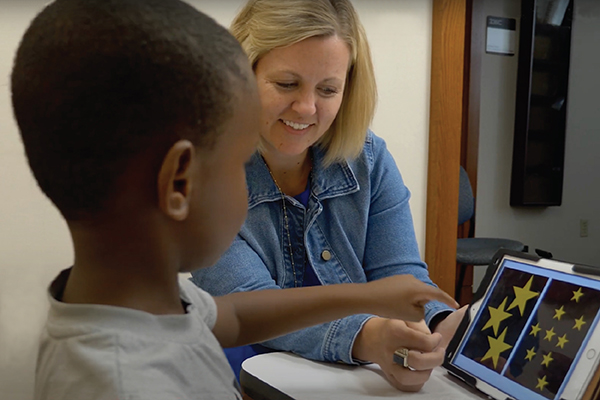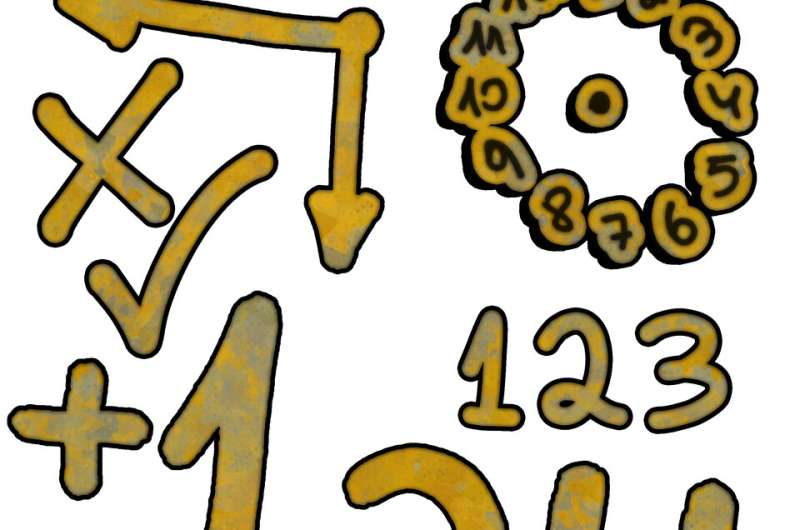
Mary Wagner, a University of Dayton associate psychology professor, received a $702,643 National Science Foundation grant to help preschoolers improve their math skills in preparation for math instruction in elementary classrooms.
The five-year research grant will have Wagner working with Elizabeth Gunderson, an Indiana University associate professor of psychology. The full grant, totaling $2,489,778, will fund three studies to examine how children between the ages of three and five begin learning mathematical concepts, and how that information can be used to prevent them from falling behind when learning math at later stages of their schooling.
While any child can struggle with math, those difficulties can be exacerbated for children in under-resourced schools and communities, Wagner said. Her research is focused on helping young children from those environments — many of whom lack access to high-quality, early learning resources — be more prepared when they get to kindergarten, and beyond. Children from a range of socioeconomic backgrounds will be recruited to participate, including students in Head Start programs and preschools that participate in Dayton-Montgomery County Preschool Promise, a nonprofit that helps area preschools improve their programming.
Wagner’s past studies, along with other early childhood development research, show young children can have difficulty distinguishing between numerical and spatial concepts, or magnitudes. For example, if they see three elephants and six mice, they might say there are more elephants than mice because the elephants are larger in size.
“They’re just trying to figure out their world,” Wagner said. “As a developmental psychologist, it helps to better understand what processes they’re using. If we can identify those processes, it can give educators tools to help children better understand number concepts before they’re in a formal setting.”
Wagner found that children’s early ability to pay attention to numbers and not be distracted by size, color or shape — called flexible attention to magnitudes — helped predict future math achievement. Through the NSF grant, she’ll study whether interventions could improve young children’s flexible attention to magnitudes, and if that improvement will affect their future mathematics achievement. She’ll also study whether the children’s socioeconomic status impacts the development of that skill and future ability to succeed in math in school.
The NSF grant will build on Wagner’s past research, which included a grant from the National Institutes of Health in 2020, to study early development of mathematics skills in young children, particularly those from under-resourced backgrounds.
Wagner’s lab also supports research opportunities for UD undergraduate students. Wagner works with 15 to 20 undergraduates each year, including summer internships that allow those students to write institutional review board proposals and manuscripts, and help conduct tests working with young children. UD students get involved in data management as well, gaining a better understanding of what happens after data is collected from participants.
“Working in Dr. Wagner’s lab this summer has been an amazing experience,” said UD junior Deja Richardson. “Learning about research in psychology in my classes is one thing, but being able to apply it this summer on various tasks in the lab has been extremely beneficial. I have also been able to learn more about early childhood development by doing my own independent research with supportive guidance from Dr. Wagner. I am grateful for this opportunity and I am looking forward to utilizing it in my future career.”
6th Edition of International Conference on Mathematics and Optimization Method
Website Link:https://maths-conferences.sciencefather.com/
Award Nomination: https://x-i.me/XU6E
Instagram: https://www.instagram.com/maths98574/
Twitter: https://twitter.com/AnisaAn63544725
Pinterest: https://in.pinterest.com/maxconference20022/
#maths #numericals #algebra #analysis #analysis #mathmatics #numericals #number #complex #graphics

No comments:
Post a Comment